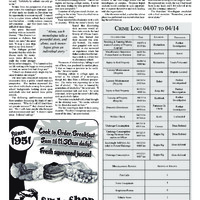outsiders monologues 2.xml
Media
Part of Outsiders' Monologues gives voice to alienation on campus
- content
-
N
EWS
www
.
daVidsoNiaN
.
com
p
age
3
C
rime
L
og
: 04/07
to
04/14
m
isCeLLaneous
r
eports
n
umber
of
r
eports
Assist Fire/Medic
Alarms
Noise Complaints
1
Vehicle Starts
2
911 Hang Ups
0
0
Escorts
1
t
ime
L
oCation
D
isposition
C
LassifiCation
04/07/14
2205 hrs
Miscellaneous Suspicious
Person/Arrest on Warrants
Knobloch
Arrest
Breaking & Entering Misde-
meanor/Larceny of Property
(Laptop)
04/07/14
1519 hrs
Richardson
Further
Investigation
Injury to Real Property
04/08/14
0000 hrs
Richardson
Leads Exhausted
Larceny Misdemeanor
(Bicycle)
04/10/14
1928 hrs
Sentelle
Property Located
Larceny Misdemeanor
(Bicycle)
04/10/14
2102 hrs
Baker
1
0
Other
3
Further
Investigationl
Injury to Real Property
Larceny of Property
(Bicycle)
Domestic Disturbance
Welfare Check
04/11/14
1058 hrs
04/11/14
1600 hrs
04/13/14
0031 hrs
04/13/14
0154 hrs
Ridge Rd
Knobloch
Little
Patterson Ct.
Circle
Further
Investigation
Further
Investigation
Further
Investigation
Unfounded
Underage Consumption
04/13/14
0313 hrs
Cannon
Dean Referral
Underage Consumption/
Giving Fictitious Infor-
04/12/14
0005 hrs
Kappa Sig
Dean Referral
Knowingly Sell/Give Al-
cohol to Person Underage
04/12/14
0005 hrs
Kappa Sig
Dean Referral
Underage Consumption
04/12/14
0057 hrs
Kappa Sig
Dean Referral
Suspicious Person
MONOLOGUES, Continued from page 1
Fire Calls
1
sciousness. “I know there are other people
at Davidson who feel the way I do,” the ac-
tor said. “Solidarity by solitude can only go
so far.”
Written from the perspective of an inse-
cure senior, the monologue continued, “part
of what made me decide on Davidson was
the opportunity to recreate myself. I wanted
to be in a place where nobody knew what I
was like before … visibly anxious, insecure,
self-conscious … and four years later, I’m
still all of those things.”
One piece discussed
hardship with an incurable
disease. “This disease is as
common as diabetes, but
there’s no cure,” the actor
said, “I keep a mini drug
store in my desk drawer.”
The dialogue pushed
the point that the while the
disease made the anony-
mous writer different, it
made the writer stronger
for his or her struggles. “I’ve learned to live
my life striving to be happy at every possible
moment, no matter how bad things are.”
“I thank my disease every single day be-
cause it makes me unique.”
The next topic concerned economic dis-
crimination from a public school student’s
perspective. The student expressed dis-
sent about individuals coming from private
school backgrounds looking down upon
individuals who had arrived from public
schools.
The following performance involved
three speakers discussing the death of one’s
own parents. “Who do I call if I don’t have
my parents anymore?” they chanted in uni-
son. “Do I call these people who betrayed
and excommunicated me? It doesn’t make
sense. It doesn’t add up.”
A Christian outlook on college social
culture was the basis for the next mono-
logue. With a religious background, the
writer did not feel comfortable participating
in the campus drinking culture. “Part of me
regrets not having college stories. I never
went crazy during the time period where it
was most acceptable.”
A routine of religious social choices, ac-
a goody two-shoes.”
Race reentered the discussion with a talk
on ancestry. While the writer’s family had
hoped that discovering
their ancestor would af-
history of African Ameri-
cans, they learned that
their ancestor was actu-
ally Scottish. The writer
then grappled with racial
identity as she recounted
an experience where her
father scolded her for hav-
ing a crush on a white boy
in elementary school.
The nature of relationships, falling in and
out of love, was pondered in another piece.
“I was no longer a spectator in the multi-
tudes,” the actor spoke.
Drinking culture in college again re-
turned as the subject of a monologue,
though this time from a different perspec-
tive. The writer was expressing his or her
fear of alcohol. “My liver is haunted by
generations of alcoholics,” the actor said. “I
played emotional hide and seek,” the actor
with an alcoholic father.
on the drinking issue. “We awake sobered
by the drink that made us bare.”
The last monologue dealt with an eating
disorder. “Food isn’t dangerous anymore …
most of the time,” an actor recited.
“Who wants to divulge their problems to
someone who is free?”
After the event was over, Ian Thomson
’15, a Friends of the Arts intern, shared that
Friends of the Arts brings events like the
monologues on campus. Thomson hoped
students would continue to seek opportuni-
ties to express themselves and seek funding
with the organization.
After the event ended, a submitter whose
piece was performed was moved when hear-
ing the performance.
“When they started reading my mono-
logue, it took me a moment to recognize my
writing,” the author said. “In a matter of a
few seconds, I went from being relatively
disconnected to being on the verge of tears.
He expressed my words the way I had heard
them in my head, and I felt relieved at the
end, like a strange catharsis.”
The Outsiders’ Monologues concluded
never alone.”
“Alone, each
monologue tells a
powerful story, and
alone, each mono-
logue gives an
individual story.” - Is Format Of
-
 outsiders monologues 2.pdf
outsiders monologues 2.pdf
